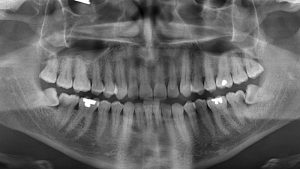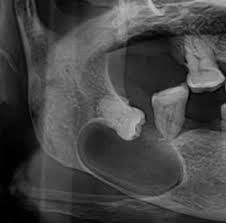
Radiograph of caries from wisdom teeth.
Poorly positioned impacted teeth can cause many problems.
When wisdom teeth are partially erupted through the gums it is difficult to keep the area clean. This results in food getting stuck, and plaque and tartar begin to build up. Discomfort may progress to pain, swelling and jaw stiffness as gum infection develops.
Cavities may also form on either wisdom tooth or the second molar in front. People who have wisdom teeth removed when they are younger tend to have a quicker recovery (less pain and swelling) and fewer complications.

Radiograph of coronal cyst from impacted wisdom teeth.
More serious problems with wisdom teeth are rare but can occur when tumors or cysts form around impacted wisdom teeth, resulting in the destruction of the jaw bone and healthy teeth.
Wisdom Teeth Removal Burnaby
The process of having your wisdom teeth removed is not complicated, but you should make sure you have a few days off, and adhere to recommendations for pain and healing.
Wisdom teeth removal (extraction) is almost always performed as an outpatient procedure. This means you go home the same day.
You’ll receive instructions from the hospital or dental clinic staff on what to do before the surgery and the day of your scheduled surgery. You may need some prescriptions (antibiotics, pain) and someone to drive you home from the procedure.
Certain soft foods are better to eat in the first few days.
Types of Anesthesia Used during Wisdom Teeth Removal
Your dentist or oral surgeon may use one of three types of anesthesia, depending on the expected complexity of the wisdom tooth extraction and your comfort level.
Options include:
- Local anesthesia. Your dentist administers local anesthesia with one or more injections near the site of each extraction. Before you receive an injection, your dentist or surgeon will likely apply a substance to your gums to numb them. You’re awake during the tooth extraction. Although you’ll feel some pressure and movement, you shouldn’t experience pain.
- Sedation anesthesia. Your dentist or oral surgeon gives you sedation anesthesia through an intravenous (IV) line in your arm. Sedation anesthesia suppresses your consciousness during the procedure. You don’t feel any pain and will have limited memory of the procedure. You’ll also receive local anesthesia to numb your gums.
- General anesthesia. In special situations, you may be offered general anesthesia. You may inhale medication through your nose or have an IV line in your arm, or both. Then you lose consciousness. Your surgical team closely monitors your medication, breathing, temperature, fluids and blood pressure. You’ll experience no pain and have no memory of the procedure. Local anesthesia is also given to help with postoperative discomfort.
Things to Be Aware of After Wisdom Teeth Removal
As you heal from your surgery, follow your dentist’s instructions on:
- Bleeding. Some oozing of blood may occur the first day after wisdom tooth removal. Avoid excessive spitting so that you don’t dislodge the blood clot from the socket. Replace gauze over the extraction site as directed.
- Pain management. You may be able to manage pain with an over-the-counter pain reliever, such as acetaminophen (Tylenol, others), or a prescription pain medication from your dentist or oral surgeon. Holding a cold pack against your jaw also may relieve pain.
- Swelling and bruising. Use an ice pack as directed by your dentist or surgeon. Any swelling of your cheeks usually improves in two or three days. Bruising may take several more days to resolve.
- Activity. After your surgery, rest for the remainder of the day. Resume normal activities the next day, but avoid strenuous activity for one week because this might result in losing the blood clot from the socket.
- Beverages. Drink lots of water after the surgery. Don’t drink alcoholic, caffeinated, carbonated or hot beverages in the first 24 hours. Don’t drink with a straw for at least a week because the sucking action can dislodge the blood clot from the socket.
- Food. Eat only soft foods, such as yogurt or applesauce, for the first 24 hours. Start eating semisoft foods when you can tolerate them. Avoid hard, chewy, hot or spicy foods that might get stuck in the socket or irritate the wound.
- Cleaning your mouth. Don’t brush your teeth during the first 24 hours. Rinse your mouth, spit or use mouthwash during the first 24 hours after surgery. Be particularly gentle near the surgical wound when brushing and gently rinse your mouth with warm salt water every two hours and after meals for a week.
- Do not smoke for at least 72 hours after surgery — and wait longer than that if possible. If you chew tobacco, don’t use it for at least a week. Using tobacco products after oral surgery can delay healing and increase the risk of complications.
To enquire about wisdom teeth removal in Burnaby, please contact us.
